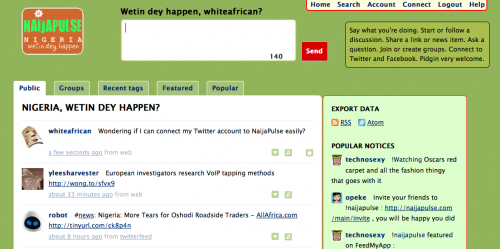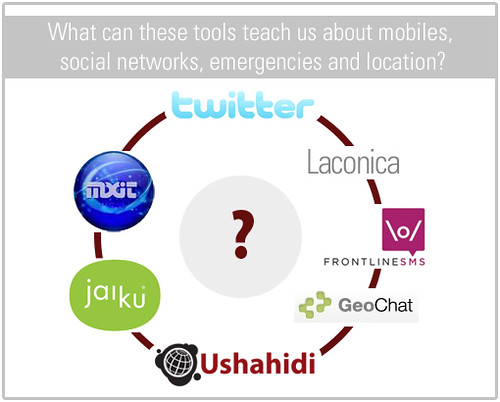I was pleased to find out about a NaijaPulse yesterday, through Loy Okezie at Startup Africa. It’s a new microblogging platform, like Twitter, except made to operate in Nigeria (Twitter used to be global, but shut that down to just the US, Canada and India last summer). Everyone is tied to a 140-character update limit, and as Twitter is showing, that is plenty.
I really like what NaijaPulse has done with connecting the service to Facebook and Twitter. That way users of the service don’t need to duplicate their entries in both systems. They’ve also created a group feature and support the OpenMicroBlogging protocol that let’s their service share with others easily.
Growing Africa’s federated microblogging network
NaijaPulse represents a significant step forward on the African continent: utilizing the web + mobile phone to provide communication services that can ultimately be built on top of. I know of one other project going on to do the same thing in another African country. My hope is that we see this implementation of federated systems continue to proliferate around the continent. Where we can find localized versions for every country, but that also allow you to connect to a broader network if you so choose.
From the founder:
“The idea of NaijaPulse is that instead of we Africans or Nigerians getting lost in Twitter, we can use NaijaPulse where we get to meet more people from the same background, country or even streets, in doing this we get more fun from this service because our stories will be more familiar and similar and our community will be more fun. But even so, we can still even sync to both Twitter and Facebook from NaijaPulse – its a win and win situation.”
This idea of a local microblogging platforms for each country/region is where I differ on opinion from Loy. I don’t think that NaijaPulse should try to go for an Africa-wide platform. Instead, they should focus on Nigeria and getting ordinary, non-tech people using their platform. Then, as other sites like this come online around the continent, they should link up and make sure their services are compatible (which should be the case, since they’ll all likely use Laconica).
The SMS problem
Currently, NaijaPulse does not truly support SMS functionality. Instead they use your carrier’s email gateway to send and receive messages. This is a problem, as it hamstrings the future growth of a “general user” consumer base that have only basic SMS-enabled phones, and no data plans, in Nigeria. The reason why is simple, it costs to send SMS messages (not receive). If you have a person that sends out an update, and they have 100 people receiving that update via SMS then it gets expensive. Who carries that cost?
There area two possible outcomes. First, that NaijaPulse figures out a business model that allows for them to cover the cost for their service (most likely it would include subscription model and/or advertising). Second, if they can draw enough of a following, they might be able to go the way of Mxit in South Africa. Their Java-based app sits on the phone, and so a lot of people have found a way to upgrade their phones and get a data plan.
What’s next?
I think we’ll start to see new microblogging services showing up in the “hot spots” of African digerati around the continent. Nigeria was an obvious first choice, followed by the South Africans, Ghana and someone in East Africa (Uganda).
Whoever does figure out a model that works in Africa could be sitting on a gold mine of users. If there was ever a simple communication service that can work well in almost every part of Africa, this could be it.


